Dec 2022 edition
Dec 2022 edition Londekile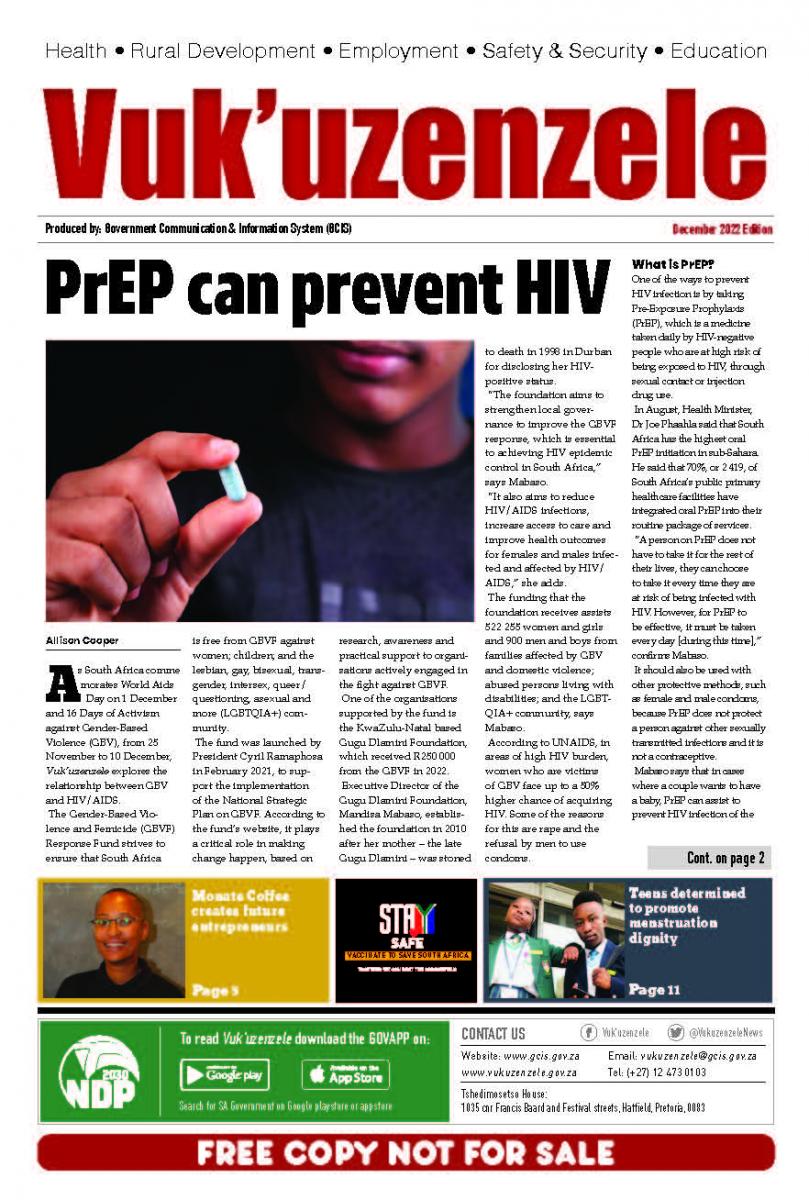
English PDF version
Translations
Afrikaans
isiNdebele
isiXhosa
isiZulu
Sepedi
Sesotho
Setswana
Siswati
Tshivenda
Xitsonga
Age-old weaving tradition given modern twist
Age-old weaving tradition given modern twist LondekileTwo KwaZulu-Natal women have teamed up to honour the ancient craft of basket weaving, while also adapting to changing trends.
While baskets made of ilala palm leaves are common, Ntombi Mabaso from Newcastle and Nozipho Majozi from Hluhluwe give their products a twist by using innovative design and incorporating colour to create an exciting product range.
Majozi, who learnt to weave from her grandmother, has been making baskets since she was young. She used to sell her creations in Durban’s South Beach. Mabaso, on the other hand, is a self-taught fashion designer who used to buy second-hand clothes that she would alter to create unique pieces.
In 2019, Mabaso bought four baskets from Majozi and set about giving them a new look, by adding leather belts and other unique touches. They were a hit with her customers and she bought more baskets from Majozi. This led to the women teaming up and to Mabaso registering her new company, called Handpicked Retro.
The product range was soon expanded to include knitted hats, children’s baskets, flower trays and laundry baskets.
However, things took a turn for the worse when the COVID-19 pandemic hit, not long after the women started working together.
“It was difficult to get stock because we live far apart. We had to wait until the movement of people and goods was allowed. I used the opportunity to think about creative ways to promote the business and reach more customers,” says Mabaso.
In 2021, thanks to support from the KwaZulu-Natal Department of Economic Development, Tourism and Environmental Affairs, Mabaso took part in various exhibitions, including the House and Garden Show, which resulted in her getting customers from across the country.
In September 2022, she took part in the Durban Business Fair after receiving training from the Small Enterprise Development Agency (SEDA). She also exhibits at monthly community markets and pop-up markets hosted by the SEDA.
Majozi has since stopped selling her baskets in
Durban and focuses on supplying Mabaso. She employs three women to help her when they get huge orders.
“Ntombi brought new
ideas, like designs and shapes, and we combined our skills very well to make our baskets stand out from the rest. I am glad that we can help other women, particularly in my area, because there are a lot of us who have the skills,” she says.
Mabaso, who uses social media and a website to market Handpicked Retro’s products, hopes to open a factory in Newcastle.
For more information visit www.handpickedretro.co.za
For more information about SEDA visit go to www.seda.org.za or call 0860 103 703.
Crossword puzzle answers refer to page 4.
Across 1. MTBPS 3. EPWP 8. SUE 11. SOLAR 12. SAIC 14. DSD 16. ZOOM 18. SAQA 19. DNA
20. LABOUR 22. TRC 23. PIN 24. BILL 26. ASSIST 27. ML
Down 2. TOLL 4. PP 5. PT 6. MISUZULU 7. YES 8. SRD 9. ECD 10. LED 13. AU 15. SANRAL
17. PARTIES 18. SU 21. BRICS 24. BRT 25. LOL
Don’t relapse this festive season
Don’t relapse this festive season LondekileThe festive season makes it even more difficult for people with substance use disorders to stay clean and sober.
Adèl Grobbelaar, the Manager of Wedge Gardens – which is affiliated to the South African National Council on Alcoholism and Drug Dependency (SANCA) – says celebrations over the festive season often result in people using alcohol more often and drinking more than they normally do.
“Recovering addicts are therefore exposed to alcohol more regularly. Drinking can lead to drug use, as alcohol lowers a person’s resistance to using other substances,” she explains.
To ensure they don’t start using again, Grobbelaar urges recovering addicts to attend their Alcoholics Anonymous (AA) and Narcotics Anonymous (NA) groups often. “Try to spend time with people who are not using substances and who understand your problem.”
Recovering addict Victor Ndlovu (25) agrees. “Engage in healthy self-care. Pick up a new, healthy activity this holiday season so you don’t revert to old patterns,” he says.
It has been almost five years since Ndlovu last got high, thanks to his determination to stay clean and treatment at Wedge Gardens.
Ndlovu, from Esther Park in Gauteng was admitted to Wedge Gardens in April 2018. His battle with addiction began with cigarettes in 2016.
“I moved on to weed and then narcotics in 2017, thinking it would be a once-off thing. I didn’t know it would take deep control of my life. I became addicted to methcathinone (CAT) and crystal meth and started using every day. I forgot about my dreams and goals,” Ndlovu explains.
One day, when his mom visited, she noticed something was wrong.
“I told her the truth and she took me to hospital, where we heard about Wedge Gardens. Going to rehab was the best decision I ever made. I was determined and didn’t look back,” says Ndlovu.
He spent one-and-a-half years at the facility. “It was a long journey, but everything I learnt keeps me focused and strong. Being clean is the best feeling ever,” he adds.
Wedge Gardens is one of the centres that is on the network of SANCA-affiliated treatment centres across the country, many of which have some beds subsidised by the Department of Social Development, there is a waiting list due to the number of people who need help.
Meanwhile Gauteng Premier Panyaza Lesufi recently launched the substance abuse helpline which will intensify the fight against substance abuse in Gauteng.
The 24-hour anti-substance abuse call centre service, led by trained call centre agents, is a platform for parents/caregivers to make applications for children and young people addicted to drugs to be accommodated at a state rehabilitation facility for treatment.
For more information about Wedge Gardens call 011 430 0320 or visit www.wedgegardens.co.za
For more information about SANCA send a WhatsApp to (076 535 1701). For a list of treatment facilities, visit www.sancanational.info/contact.
For more information about the Gauteng 24-hour anti-substance abuse call centre call 0800 228 827 or GPAntiSubstanceAbuse@Gauteng.gov.za or USSD *134*474727# and follow the prompts.
Farming a viable business in ending poverty
Farming a viable business in ending poverty LondekileMthokozisi Zwane (32) is the owner of Zamantimande Mix Farming, a grain, livestock and crop farm that produces potatoes, sweet potatoes, spinach, dry beans and maize, and raises free-range chickens, cattle and goats.
Zwane’s business is based in Mkhondo, Mpumalanaga.
He says agriculture can help fight poverty and address food security. “Many families within the black society often don’t know where their next meal will come from.”
He added that he grew up in a household where his grandfather was growing their food and learnt about farming.
Zwane says, initially he was not interested in farming. Instead, he dreamt of being a businessman. However, he grew to understand agriculture’s importance in sustaining human life.
After completing a marketing diploma from the Gert Sibande Technical and Vocational Education and Training College, Zwane left Mpumalanga for Gauteng to seek employment.
He managed to find employment as a sales and marketing agent in Alberton, but the longing to start his own business never left him.
“I resigned from my job in February 2015 and started researching agricultural businesses. After realising the scarcity of youth in the industry, I decided to capitalise on that.”
Zwane was fortunate to still have access to land that belonged to his late grandfather. While doing research in 2016, he came across a National Youth Development Agency (NYDA) Facebook post about a skills development programme for young people that was being offered in Piet Retief, Mpumalanga, and successfully applied.
Following his training, he managed to secure a
R50 000 grant from the NYDA, which he used to purchase fencing, a water tank, pipes, fertiliser and a water pump.
It is because of this grant, says Zwane, that his business is now able to permanently employ four people and hire another eight temporary employees, mainly young people, during the December holidays. He plans to expand his operations and hire more people so that he can supply chain stores not only in his hometown, but across the Mpumalanga province.
Zwane urges the youth to find out about opportunities offered by government-funded agencies. “I also urge young people to be involved in agriculture so that we can create sustainable employment and a means of ensuring food security.”
For more information about the different grants at the NYDA, log onto www.nyda.gov.za, email info@nyda.gov.za or call the toll-free number 0800 58 58 58.
Game farmers working together for community growth
Game farmers working together for community growth UrsulaAmabal’engwe Game Farm and Tourism, the first black-owned game farm in the Western Cape, hopes to soon offer accommodation, hunting and game viewing.
The Nico Lerm Trust and the Mossel Bay African Farmers Union (MAFU), as part of government’s land redistribution programme, established the farm, located in part of the Mossel Bay and Hessequa Municipalities, in 2016.
According to Vuyani Nkasayi, the Deputy Director: Communication Support Services at the National Department of Agriculture, Land Reform and Rural Development (DALRRD), R7 million was approved in the 2021/22 financial year for fencing and maintenance, staff accommodation, game, gear and equipment, training and vehicles for the game farm.
This funding ensured construction and upgrading of 28km of fencing which created jobs for locals.
A further R3.1 million has been made available by the department for the 2022/23 financial year, for equipment and the planting of five hectares of lucerne to supplement feed for the game, says Nkasayi.
Much of the Amabal’engwe Game Farm and Tourism’s success is due to a partnership between the Nico Lerm Trust and MAFU.
The Nico Lerm Trust belongs to experienced game farmer Nico Lerm.
The two organisations are an example of how well-established farmers and emerging farmers can work together to create jobs.
A passionate game farmer for more than 25 years, Lerm has five farms and has been mentoring the MAFU trust in game farming.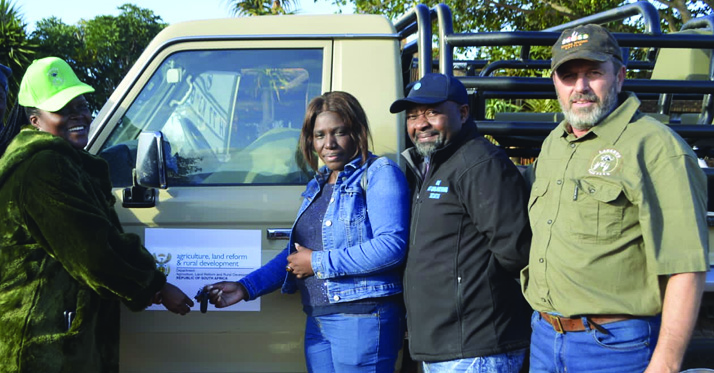
“Established farmers should assist and mentor emerging farmers as this will make South Africa a better place. Supporting emerging farmers will show citizens that we can work together. We need each other and can learn from each other. We must take our country to the next level so that the sun can shine on everyone in this beautiful country of ours,” says Lerm.
“Emerging farmers must ensure that their heart and soul are in farming. To make it a success, you must be willing to work very hard,” he adds.
Vuyiswa Skoen, the chairperson of MAFU, says the mentorship from Lerm helped the Union to learn more about game farming.
“We have been struggling with the farm for a long time and have been praying for answers. Lerm is guiding and supporting us to establish the farm, which will grow with us and become a legacy for our families and the community,” she adds.
The formation of the farm 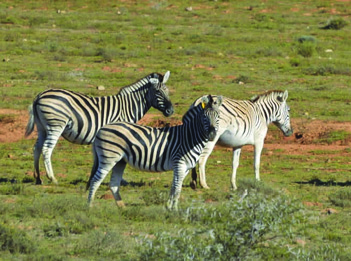
In the 1996/97 financial year, the DALRRD provided funding to the MAFU Communal Property Association (CPA) to buy farm Buffelskraal (now Amabal’engwe), as part of government’s Settlement Land Acquisition Grant.
At the time, the idea was to address Kwanonqaba residents’ grazing needs. However, as the land was located 80km away from where they lived, many beneficiaries were unable to access it, says Nkasayi.
In January 2013, the DALRRD joined forces with Lerm who was already a successful farmer in the Western Cape to drive the project forward and form Amabal’engwe with the MAFU CPA.
“When the Lerm Trust was approached to help emerging farmers, I spoke to my family and we wanted to get involved,” says Lerm.
Besides his expertise, Lerm provides the use of his vehicles, staff, tractors and administration support. He has also installed water points for the animals, built roads, erected fencing and supplied game.
“To date, the farm has received two vehicles, wire and poles to upgrade the fences and various equipment from the DALRRD,” says Lerm, who is managing the farm until the MAFU takes over.
Eventually, the farm will have R4.5 million worth of wildlife. Of this, 60% of the offspring will belong to MAFU and 40% to the trust.
Nkasayi says the project also aims to grow and develop marginalised producers to help alleviate poverty and ensure economic growth and job creation.
“The project will facilitate self-employment and improve the livelihoods of marginalised households within the CPA. Job opportunities and training are central to DALRRD’s investment,” says Nkasayi.
For more information about the Department of Agriculture, Land Reform and Rural Development visit www.dalrrd.gov.za/
Girls’ soccer team makes country proud
Girls’ soccer team makes country proud LondekileGirls can do anything that boys can do, and it is only fair that we present them with the same opportunities so that they can thrive.
This is according to Edendale Technical School Principal Fano Ngubane, who shared his excitement after the Under-15 girls’ football team from his school won the 2022 Confédération Africaine de Football (CAF) African Schools Championship in Lilongwe, Malawi recently.
The tournament took place over two days, and the Edendale Technical Secondary School beat Botswana’s Mothamo High school girls' football team by five goals to nil during the finals.
Edendale Technical School is based in Pietermaritzburg in KwaZulu-Natal.
“I am very happy and excited for my girls. For a long time, girls were denied participation in certain sporting codes like soccer. Girls’ soccer is still a new thing in South Africa and girls should be given the necessary support for them to succeed,“ he says.
Ngubane says most of the girls who play for the Under-15 team were playing for the first time at the beginning of this year’s school calendar. Due to their hard work and support from the teachers the whole team managed to win.
He encourages learners to try and balance their talents with academics. 
“It is not all learners who do well academically. Some will excel in sports. Our school tries to have a variety of sporting codes to allow learners the opportunity to discover their talents so that we can nurture them,” he says.
Learners at Edendale Technical School can participate in sporting codes that include soccer, chess, rugby, netball, basketball, indigenous games, choral music, tennis, volleyball, and athletics.
Ngubane has been the principal of the school since 1998.
The school specialises in offering commercial, technical and science subjects to 1 800 learners from Grade 8 to Grade 12.
KwaZulu-Natal MEC for Sport, Arts, and Culture Amanda Bani-Mapena expressed pride at this achievement and said the future of school sport and women's football looks bright.
“We congratulate Edendale Technical School for lifting high the flag of KwaZulu-Natal and women's football in particular. We hope this win will inspire the next generation of women footballers,” says MEC Bani-Mapena.
According to the department, the school walked away with R1. 8 million in prize money from the six-girl teams' tournament of the Southern African Schools.
Infrastructure development brings jobs to locals
Infrastructure development brings jobs to locals LondekileFikiswa Fuxwana is one of the local people who can now provide for her family thanks to the construction of the Msikaba Bridge which forms part of the South African National Roads Agency’s N2 Wild Coast project.
“I started working here in 2020 as a general worker, I got promoted as a site clerk, my job includes making sure that plants have fuel”, said Fuxwana.
She added that before the construction of the bridge she struggled with employment opportunities.
“After receiving a job due to this construction my life changed. I am a breadwinner in my family. I am now able to provide them,” said Fuxwana.
The project has created over 446 job opportunities for community members that reside in the villages of Lambasi, Nkunzimbini which are in close proximity to the site. The local community has received jobs as general workers, safety administrators, and store clerks.
The project is expected to connect the Eastern Cape and KwaZulu-Natal provinces.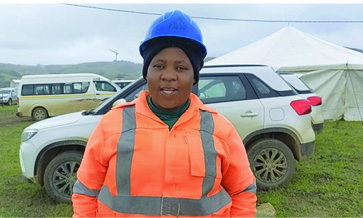
Local business people such as suppliers, service providers, and sub-contractors are also said to be benefiting from the R4 billion budget for the construction of the project.
Minister of Transport, Fikile Mbalula recently visited the Msikaba Bridge to assess progress made in the construction of the bridge.
“These kinds of projects must provide skills to the black underprivileged communities. Contractors must transfer skills to residents so that when the project is completed, rural communities can stand on their own,” said Minister Mbalula when addressing residents.
The bridge is expected to be completed in April 2024.
On completion, the N2 Wild Coast project will contribute to economic growth and job recovery initiatives by the government. The project will also ensure safe traveling and improved road safety for villages along the country's Wild Coast.
Jobs figures show our economy is on the road to recovery
Jobs figures show our economy is on the road to recovery vuyelwanFrom The Union Buildings
Over the last few years, South Africans have had to contend with slow growth and rising unemployment.
This has been worsened by a devastating pandemic, an attempted insurrection unrest in July 2021, and, earlier this year, severe floods in parts of KwaZulu-Natal, Eastern Cape and North West.
Amidst all this, the energy crisis has loomed large, causing damage to the economy and hardship for households and businesses.
Yet, even amidst these formidable challenges, our society and economy has proven to be resilient. And indications are that our economy is showing encouraging signs of recovery.
The latest employment figures, in particular, give us grounds for cautious hope. 
Statistics South Africa recorded a decline in the unemployment rate for the second quarter of 2021. Significantly, their measurement shows that the actual number of people employed rose from 14.5 million people in the fourth quarter of 2021 to 15.5 million in the second quarter of 2022. This is an encouraging increase of much-needed jobs over the first half of this year.
These jobs were mainly created in sectors such as community and social services, trade, finance and, notably, construction.
Of course, much more needs to be done if we are to make a significant dent in our country’s high unemployment rate.
At the same time, these figures indicate that the priority areas of the Economic Reconstruction and Recovery Plan – such as mass public employment, economic reform and infrastructure development – are having an impact on job creation.
With infrastructure development and investment being one of the key priorities of our recovery plan, the growth in jobs in the construction area is particularly encouraging.
The February 2022 budget outlined a 30% increase in spending on public infrastructure over the next three years to R812 billion, compared to R627 billion over the past three years.
The Construction Industry Development Board recently noted that there has been an increase in infrastructure projects driven by state-owned enterprises like Transnet and Eskom, but also in the metros and through the Department of Public Works and Infrastructure.
In June, this year we saw our economy return to pre-pandemic growth levels owing to a fairly positive GDP outcome in the first quarter of the year. Naturally the objective is to move significantly off this low base, which is why we are continuing with our focus on structural reforms that drive growth.
Government recently published a proposed amendment to remove the licensing threshold for electricity generation facilities and encourage investment in larger, utility scale projects to rapidly add new generation capacity to the grid. This represents a major milestone in our efforts to transform the country’s energy landscape, a critical prerequisite for economic growth and attracting investment.
Since the national energy plan was announced in July this year, we have been working as government in partnership with various stakeholders on implementation and policy reform.
Since we raised the licensing threshold to 100 megawatts in June 2021, more than 500 MW of private renewable power generation projects have been registered, with a pipeline of over 6,000 MW of projects at various stages of development.
The structural reform process continues to register progress in support of economic growth and attracting investment.
Economic growth cannot be realised and jobs cannot be created without undertaking the difficult but necessary structural reforms that will improve the business and investment climate. This is government’s role.
However for success to be guaranteed, we will need to forge consensus between business, labour and civil society not only on the reforms that are needed, but on the trade-offs that are necessary to achieve our goals.
While our economy takes time to recover and our reform programme is implemented, we will continue to pursue a range of complementary interventions to support job creation. Alongside the measures that supports private sector growth, we will expand public employment and ensure social protection for the most vulnerable.
The growth in employment, together with other promising signs of recovery, should encourage us to push ahead with the reforms and implement our Economic Reconstruction and Recovery Plan to unlock investment and growth. It should encourage all social partners to work more closely and with greater urgency and purpose to achieve faster growth and create more jobs.
Letters to the editor
Letters to the editor vuyelwanDear Vuk’uzenzele
My name is Makhosini Manana
I am interested in starting a rabbit farming project.
I recently learnt about the benefits of rabbit farming and I have developed a love for it.
May you please assist me with more information about how I can put my dreams into action.
Warm regards
Makhosini Manana
Dear Makhosini
Thank you for reaching out to Vuk’uzenzele Newspaper. It is always a pleasure to receive letters from our readers.
Firstly, well done for trying to venture into the agricultural space and being part of the food security sector in our country.
Visit your nearest Small Enterprise Development Agency (SEDA) office where you will receive a wealth of information about how to start your project. SEDA has a national footprint around the country.
You will receive all the information which is in line with starting a project in the agricultural space. SEDA will also advise you on which government agency will be able to give financial and non-financial support. You can also visit www.seda.org.za, send an email to info@seda. org.za, or phone the SEDA National Information Centre at 0860 103 703 for more information.
Furthermore the following article has interesting information about rabbit farming visit https://smesouthafrica.co.za/a-guide-to-launching-a-rabbit-farming-agri…
Good luck
Monate Coffee creates future entrepreneurs
Monate Coffee creates future entrepreneurs vuyelwanComing from Cape Town to Johannesburg to fulfil her entrepreneurial dream, Tumi Khobane (32) is celebrating Africa through coffee.
After completing her studies and moving to Johannesburg, Khobane’s future was given a shot of caffeine-fuelled adrenaline when she fell in love with coffee and established a family business, Monate Coffee in 2017.
The business is funded by shareholders including a business loan from ABSA.Khobane says she has dedicates 90% of her time to ensuring that her start-up is a success.
“The reason I started Monate Coffee was to fulfil the South African mandate, which is creating jobs for people who are unemployed,” says Khobane. 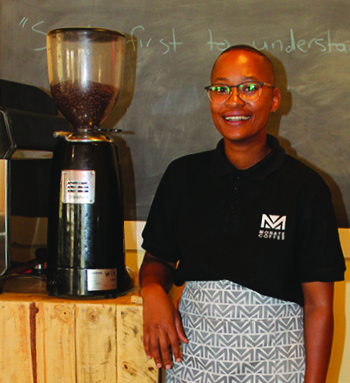
She added that she did not have any professional coffee training.
“I am self-taught, I also asked some industry friends to show me some things related to coffee. I also learnt from watching videos online and did research about coffee.”
She hopes that her journey will inspire the youth to know that coffee has viable career opportunities, such as being a barista, roaster or part of the coffee supply chain. The company also offers training to prospective Monate Coffee baristas.
Monate Coffee is a growing enterprise that already operates in three locations – Cedar Square in Fourways, Peter Place in Bryanston and TotalEnergies Elandsfontein in Lichtenburg, North West.
The company sources its coffee beans from Uganda, Rwanda and Ethiopia and roasts them to create various coffee varieties.
Customers can enjoy coffee on location, buy ground coffee or organise to have Monate Coffee on Wheels, a mobile coffee unit which serves a variety of coffee drinks at private functions. There is also an online store.
She added that much of the world’s Arabica coffee is grown in Africa and coffee plants originated in Ethiopia. It is time for black South Africans to learn more about the drink, says Khobane, who hopes to form a coffee forum for black-owned coffee businesses in Africa to learn from one another.
So far Monate Coffee has created job opportunities for nine people, with three people employed at the North West outlet, three at Cedar Square and two people forming part of the production team.
Khobane encourages her team to explore all avenues of the business and develop their skills. In three years, she hopes to have a fleet of Monate Coffee on Wheels units so that she can turn employees into entrepreneurs that manage their own coffee businesses under the Monate Coffee brand.
Khobane has a BCom in Economics and Management from Rhodes University and an entrepreneurship qualification from the University of Cape Town.
For more information about Monate Coffee, visit www.monatecoffee.com
People with disabilities given hope for a better future
People with disabilities given hope for a better future UrsulaA group of unemployed people – all living with disabilities in Kuruman in the Northern Cape – have been given a chance to better their lives by Assmang Black Rock Mine Operations.
Forty men and women with matric were selected to be part of a learnership programme offered by the mine, which operates in the area. Administered by the EduPower Skills Academy, the 12-month learnership prepares beneficiaries in data management, customer care training and live campaigns. Assmang Black Rock Mine Operations says it plans to offer full-time employment to the learners on completion of the programme.
Among the beneficiaries is Victor Tshekedi (38) who has a lower leg deformity and uses crutches. Tshekedi says he has never been employed, despite numerous attempts to secure a job, because job opportunities in the area are scarce. This is especially true for people living with disabilities.
He heard about the learnership from a friend and is grateful for the opportunity to learn new skills. “This will open opportunities for me to get employment,” he says.
With 3 November to 3 December being Disability Rights Awareness Month, Tshekedi says disabilities do not define a person. “Don’t wait for things to happen, make them happen.”
Another beneficiary, Refilwe Matshoanen (24), is unable to use her left hand, which was burnt when she was seven months old.
Despite having a N5 in Office Management studies, Matshoanen has battled to find a job. She is hopeful that the programme will boost her self-esteem after having numerous job applications turned down. “Even if you have a physical disability, your mind is not disabled. It is not an illness and you can succeed. Be there for other people with disabilities and further your studies,” she says.
Once she completes her learnership, she wants to find a stable job and is prepared to relocate to a bigger town.
Sean Sharp, EduPower Skills Academy’s Executive Head of Sales, says they realise that many people battle to accept their disability and hope that by including them in this empowerment programme, they will feel more accepted.
All other candidates interested in the learnership can apply through the Edupower website throughout the year.
For more information visit www.edupower.co.za/careers/
PrEP can prevent HIV
PrEP can prevent HIV vuyelwanAs South Africa commemorates World Aids Day on 1 December and 16 Days of Activism against Gender-Based Violence (GBV), from 25 November to 10 December, Vuk’uzenzele explores the relationship between GBV and HIV/AIDS.
The Gender-Based Violence and Femicide (GBVF) Response Fund strives to ensure that South Africa is free from GBVF against women; children; and the lesbian, gay, bisexual, transgender, intersex, queer/questioning, asexual and more (LGBTQIA+) community. 
The fund was launched by President Cyril Ramaphosa in February 2021, to support the implementation of the National Strategic Plan on GBVF. According to the fund’s website, it plays a critical role in making change happen, based on research, awareness and practical support to organisations actively engaged in the fight against GBVF.
One of the organisations supported by the fund is the KwaZulu-Natal based Gugu Dlamini Foundation, which received R250 000 from the GBVF in 2022.
Executive Director of the Gugu Dlamini Foundation, Mandisa Mabaso, established the foundation in 2010 after her mother – the late Gugu Dlamini – was stoned to death in 1998 in Durban for disclosing her HIV-positive status.
“The foundation aims to strengthen local governance to improve the GBVF response, which is essential to achieving HIV epidemic control in South Africa,” says Mabaso.
“It also aims to reduce HIV/AIDS infections, increase access to care and improve health outcomes for females and males infected and affected by HIV/AIDS,” she adds.
The funding that the foundation receives assists 522 255 women and girls and 900 men and boys from families affected by GBV and domestic violence; abused persons living with disabilities; and the LGBTQIA+ community, says Mabaso.
According to UNAIDS, in areas of high HIV burden, women who are victims of GBV face up to a 50% higher chance of acquiring HIV. Some of the reasons for this are rape and the refusal by men to use condoms.
What is PrEP?
One of the ways to prevent HIV infection is by taking Pre-Exposure Prophylaxis (PrEP), which is a medicine taken daily by HIV-negative people who are at high risk of being exposed to HIV, through sexual contact or injection drug use.
In August, Health Minister, Dr Joe Phaahla said that South Africa has the highest oral PrEP initiation in sub-Sahara. He said that 70%, or 2 419, of South Africa’s public primary healthcare facilities have integrated oral PrEP into their routine package of services.
“A person on PrEP does not have to take it for the rest of their lives, they can choose to take it every time they are at risk of being infected with HIV. However, for PrEP to be effective, it must be taken every day [during this time],” confirms Mabaso.
It should also be used with other protective methods, such as female and male condoms, because PrEP does not protect a person against other sexually transmitted infections and it is not a contraceptive.
Mabaso says that in cases where a couple wants to have a baby, PrEP can assist to prevent HIV infection of the HIV-negative partner and the unborn baby.
Meanwhile, earlier this year, the South African Health Products Regulatory Authority approved the use of a vaginal ring as a PrEP. The ring contains an antiretroviral drug called dapivirine and must be changed every month. In addition, a new PrEP – an injection that lasts for two months – is awaiting approval. Once approved, people will no longer have to remember to take a pill each day.
Safe sex
The foundation also aims to reduce HIV infections by promoting the use of condoms and safe sex.
“We urge children and youth to delay engaging in sexual intercourse until they are ready to make more informed and healthier choices,” says Mabaso.
“We also promote safer sex by emphasising condom use and only having one partner at a time. The abuse of drugs – especially those that are injected – is strongly discouraged as it increases the risk of being infected with HIV,” she adds.
The foundation also empowers people living with, at risk of and affected by HIV/GBV to know their rights and to access justice and legal services to prevent and challenge the violations of human rights.
For more information and assistance from the Gugu Dlamini Foundation, visit www.gugudlaminifoundation.org. For more information about PrEP, visit your closest healthcare facility.
Ready to end GBVF in South Africa
Ready to end GBVF in South Africa UrsulaTo win the battle against gender-based violence and femicide (GBVF), everyone should be aware of the National Strategic Plan on gender-based violence and femicide (NSP on GBVF) and the issues it attempts to address. 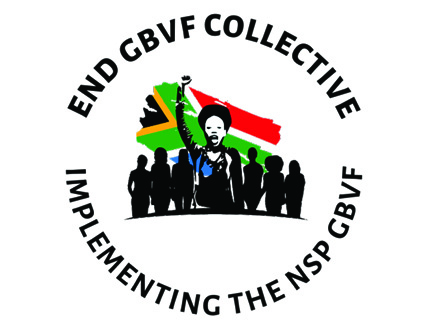
This is according to End GBVF Collective Communications Coordinator Candice Ludick, who spoke to Vuk’uzenzele at the end of the Second Presidential Summit on GBVF held recently.
“It is clear that knowledge about the NSP on GBVF is inadequate amongst all implementers. Funding and resources required for successful implementation is yet another barrier, which will hopefully be overcome through partnerships across sectors,” she says.
End GBVF Collective was established in 2020 by the United Nations (UN) Women in collaboration with the Department of Women, Youth, and Persons with Disabilities (DWYPD). This was after the NSP on GBVF came into effect.
It operates entirely online and is an informal and voluntary platform that is open to all partners involved in GBVF response in South Africa. The platform creates space for the government, civil society, development agencies, and private citizens to think and plan together.
“End GBVF Collective is a volunteer network that exists to implement the NSP on GBVF. The purpose is to create a space for those working on the GBVF response, across all sectors, to come together to think and plan to strengthen the multi-sectoral response to the GBVF epidemic,” she explains.
After the summit, Ludick is optimistic that people will recognise the value of collaboration across sectors and join forces to implement the NSP on GBVF as a matter of urgency.
“We are two and half years into the implementation of the strategy, an ideal time to accelerate and amplify our efforts,” she says.
Help on social media
End GBVF Collective Social Media Manager Dimakatso Mudau says its social media followers have received valuable assistance and referrals by using various platforms such as Twitter, Facebook, and Instagram to get information.
“If you need help, you can send us a direct message using these social media platforms and we will find a way to help you,” she says.
To find out more about End GBVF Collective, you can visit www.gbvf.org.za
Individuals who want to be part of the platform can also sign up on the website to join one of the six pillars of the NSP on GBV that best represents their interests at https://bit.ly/end GBVF
For enquiries, you can email whitney.leje@women.gov.za.
Did you know?
The NSP on GBV is centered
around six pillars, namely:
- Accountability, coordination and leadership
- Prevention and rebuilding the social cohesion
- Justice, safety and protection
- Response, care, support and healing
- Economic power
- Research and information management
Helpful numbers
If you are a survivor of GBV and need help, contact the following;
- South African Police Service: 10111
- GBV Command Centre: 0800 428 428, or send a ‘Please Call Me’ to *120*7867# or SMS ‘help’ to 31531. A Skype Line is also available for members of the deaf community (add ‘Helpme GBV’ to your Skype contacts). The centre operates 24 hours, seven days a week.
- Rape Crisis is a 24 hours service meant for survivors of rape and sexual assault. For assistance call the following numbers, English- 012 447 9762, isiXhosa- 021 361 9085, Afrikaans- 021 633 9229.
- National Shelter Movement of South Africa helps GBV survivors who are seeking shelter. Call 0800 001 005.
- South African Depression and Anxiety Group is a 24 hours suicide helpline dial 0800 456 789.
- Lifeline supports for victims of physical, emotional, financial and sexual abuse. Call 0800 150 150.
- People Opposing Women Abuse (POWA) provides shelter services for GBV victims and their children, counselling and legal advice. Call 011 642 4345 / 6, or 076 694 5911 log on to www.powa.co.za/POWA
- Childline South Africa provides services for abused children and their families. Dial 116 toll-free or visit www.childlinesa.org.za.
Sandwiches put bread on the table of unemployed dad
Sandwiches put bread on the table of unemployed dad vuyelwanIn 2019, Itumeleng Lekomanyane (30) spent his last money to buy ingredients for sandwiches that he planned to sell at Johannesburg taxi ranks.
Unemployed and with a daughter to raise, he knew he needed to come up with a plan to earn money.
Today, he is the proud owner of Sandwich Nton Ntons, which has two stores, bakes customised cakes, offers catering services and still sells sandwiches and other goods on the street.
Lekomanyane runs his business in the Johannesburg city centre. He is originally from Mahikeng, North West. 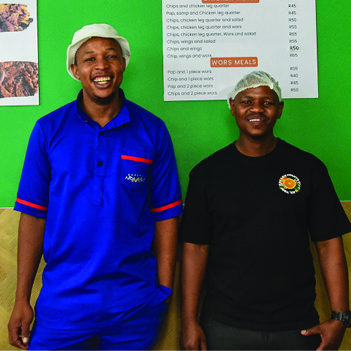
He added that Sandwich Nton Ntons has created 25 job opportunities.
Like most youth, Lekomanyane had a tough journey. After redoing matric in 2012, he went to college but had to drop out because of a lack of money. He found temporary employment and after that, opened an embroidery and printing business, which failed after two years.
Frustrated, Lekomanyane looked for other entrepreneurial opportunities. He noticed that most vendors at Johannesburg’s busy taxi ranks sold only basic morning food, such as scones, and came up with the idea of selling sandwiches.
Taking a risk, he used his child’s maintenance money of R800 to make 16 sandwiches and although only five sold, he persevered. He says no matter how tired he was, he would wake up early enough to prepare his sandwiches and be at the taxi ranks at 5am, when people started commuting to work.
To this day, Lekomanyane, his business partner Sammy Diphoko and employees put in a lot of effort to keep customers talking about their tasty food.
In the next five years, Lekomanyane wants to open three more stores and join Uber Eats.
The business’ growth has not been without setbacks, with one of the worst being when two employees stole all the company’s money.
He advises the youth to start small, by selling fat cakes, sweets and snacks in busy areas. He says once an enterprise is up and running, no matter how small, it is more likely to get funding.
This was the case for Lekomanyane – his business was already operating when he applied for and got a business loan and equipment for his kitchen from the Small Enterprise Finance Agency (SEFA), a government agency that provides financial products and services to small, medium and micro enterprises and cooperatives.
For SEFA funding, log on to https://www.sefa.org.za/
Sauce maker is back in business after floods
Sauce maker is back in business after floods LondekileSmall businesses that were destroyed by the devastating April floods in KwaZulu-Natal have been thrown a lifeline by the Department of Small Business Development.
When the floods swept through the province, causing billions of rands in infrastructure damage and killing over 450 people, small businesses in Durban and Stanger on the province’s north coast were hardest hit. Some lost everything and had to start from scratch, while others lost their equipment and stock.
After an assessment in July 2022, the department set aside an emergency flood recovery fund of R50 million for formal businesses and R10 million for informal businesses.
Claims for relief funding by businesses ranged from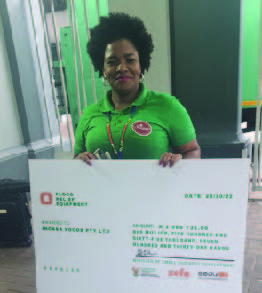
R10 000 to R1.6 million. While some claims were still being processed, the department recently handed over equipment to 44 small businesses in Durban, at a cost of R19 million.
Among those affected was Thabisile Shange (47), the owner of Incasa Foods, an agro-processing business that manufactures sauces and pastes. The business is located in Warwick Triangle in the Durban central business district, where many informal and small businesses operate. The area was badly affected by the floods.
The floods hit barely a month after Shange had received a R1.5 million machines from the Agribusiness Development Agency (ADA) to support the growth of her business. She says the water was above knee level in her workshop and her equipment was damaged beyond repair.
“I had to go back home and use the smaller machine I had been using before I received support from the ADA, but it proved to be unsustainable. I could not meet the demand and the domestic machines would break because they were not made for high-volume production. But I had to continue paying the permanent staff and also ensure that I kept the market I had established,” she says.
Fortunately, the Department of Small Business Development, through the Small Enterprise Development Agency (SEDA), was quick to appoint a service provider to install Shange’s new equipment.
“Small and informal businesses play a key role in ensuring every household has bread on the table. The government will make sure that all those who lost stock due to floods are assisted to get back into business. The other normal programmes to help small businesses are still available and we encourage people to apply for assistance,” said Minister of Small Business Development Stella Ndabeni-Abrahams during the handover ceremony.
Incasa Foods employs 15 people, 10 of whom are interns employed through the Food and Beverages Manufacturing Sector Education and Training Authority.
For more information about the Food and Beverages Manufacturing Sector Education and Training Authority visit www.foodbev.co.za
For more information about the SEDA visit www.seda.org.za
Second Presidential Summit on GBVF
Second Presidential Summit on GBVF UrsulaThe responsibility to end gender-based violence and femicide (GBVF) lies with men, not women.
This is according to President Cyril Ramaphosa, who recently addressed the second Presidential Summit on GBVF at the Gallagher Estate in Midrand, Gauteng under the theme: “Accountability, Acceleration and Amplification, NOW!”
The first summit was held in 2018. This year, the summit assessed progress made in fulfilling the commitments made at the first summit in implementing the National Strategic Plan on GBVF.
The NSP aims to provide a multi-sectoral, coherent strategic policy and programming framework to strengthen a coordinated national response to the crisis of GBVF by the government and the country as a whole.
President Ramaphosa said despite efforts to fight GBVF, violence against women and children is still persistent in the country.
Data from the South African Police Service shows that sexual offences and rape increased by 13% between 2017/18 and 2021/22.
“Between the first quarter of 2021 and the first quarter of 2022 there was a 52% increase in the murder of women, and a 46% increase in the number of children murdered,” said the President.
He said since the last summit, 83 courts have been upgraded into Sexual Offences Courts.
He added that Thuthuzela Care Centres (TCCs) are proving effective in improving conviction rates.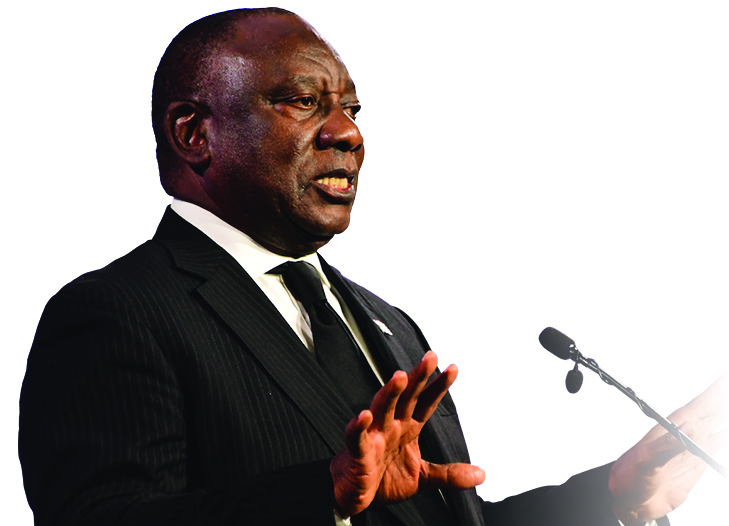
“In the last financial year, a conviction rate of 77% was obtained for cases reported at Thuthuzela Care Centres. As it stands, out of 52 districts across the country, 45 have at least one GBV shelter and 85% of these are government funded,” he said.
Resolutions of the summit
The delegate who attended the summit also came up with a set of resolutions that seek to end the scourge of GBVF.
Some of the resolutions of the summit included increasing funding for the implementation of the NSP across all six pillars, from the government and the private sector.
The establishment of a coordination system that will address GBV on children that includes civil society. This system will be established by the Presidency and led by the Director-General.
Furthermore, delegates agreed that there should be an effective referral system for survivors of GBV and well-resourced Thuthuzela Care Centres in all districts.
What is a Thuthuzela Care Centres?
Thuthuzela Care Centers (TCCs) are run by the National Prosecuting Authority. They make sure that GBV victims receive holistic care, including treatment and counseling.
They work closely with hospitals where victims of rape and sexual assault can receive care, have evidence collected, and have their statements recorded by the SAPS. Court preparation services are also provided.There are more than 50 TCCs in South Africa. For a list of TCCs and their contact details, visit www.justice.gov.za/vg/TCCs-list.pdf
Supporting adopted children who are survivors of GBV
Supporting adopted children who are survivors of GBV UrsulaIf you are parenting an adopted child that is a survivor of gender-based violence (GBV) it is important for you and the child to get psychological counselling.
This is according to Keabetsoe Sekoboto the Executive Director and Adoption Social Worker for Setshabelo Family and Child Services, based in Botshabelo in the Free State.
“We recommend families, mostly adoptive families to be trauma-informed so that they provide care that is responsive to the needs of their children but also facilitates a sense of safety, belonging, and healing.
“Counselling prepares the parents to be on the same page when a child has disruptive behaviour or has certain emotional reactions as a result of trauma associated with GBV. Keeping in mind that adopted children also have unique needs in terms of giving and receiving affection,” said Sekoboto.
Setshabelo Family and Child Services is the first black-owned adoption agency in South Africa. It also has community programmes that assist survivors of GBV. It recently received R300 000 from the National Development Agency to provide victim empowerment services at two police stations within Botshabelo.
The Department of Social Development in the Free State also assisted Setshabelo Family and Child Services with R262 000 in the 2021/2022 financial year and R282 000 for the current financial year of 2022/2023.
The funding was used to implement victim empowerment programmes at two police stations in Botshabelo.
Sekoboto added that counselling helps child survivors to heal, learn to trust again and have secure attachment with adult figures.
“Counselling helps curb the negative effects of Adverse Childhood Experiences (ACE). ACEs are traumatic events that occur in childhood. ACEs can include violence, abuse, and growing up in a family with mental health or substance use problems.”
According to Sekoboto, toxic stress from ACEs can change brain development and affect how the body responds to stress. ACEs are linked to chronic health problems, mental illness, and substance misuse in adulthood.
Healthy families
She added that a healthy and resilient family is a basic unit where children get their primary sense of safety, security and belonging for them to thrive.
“Adoption is unique and is unlike many other life situations families face. The process in itself can be overwhelming for adoptive parents and adopted children. It is even more challenging for a family if the child is a survivor of GBV.”
Sekoboto said GBV can leave a child scarred forever if trauma counselling/therapy is not provided.
“Families can only heal their children from their wounds if they have healed and are aware of the trauma a child experienced. That means it’s important to have a counsellor working with the family through those experiences.”
She added that pre-adoption counselling, specifically about trauma, can prepare prospective adoptive parents for the effects that trauma might have on the adopted child.
Keeping adoption a secret
Sekoboto advised families not to keep the adoption a secret to ensure that the adopted child is well integrated into the family system.
“Parents should communicate with their families about the adoption even before the child is placed in their care.
“Once the child is part of the family, we encourage families to have a regular, positive conversation about adoption, using beautiful narratives to demonstrate the beauty of adoption.”
She said parents should use adoption as an opportunity to create a new family history and a family tree of which a child forms part of.
“It is important to reassure a safe space for children who were affected by ACEs and a family tree is one of the activities that can be used
for that purpose,” said Sekoboto.
Did you know?
- Setshabelo Family and Child Services have an open-door policy for survivors of GBV who are walk-ins.
- The organisation also has a 24-hour phone line, 051 531 9001.
- Survivors of GBV can also access the services of Setshabelo Family and Child Services through the SAPS referrals system
- Setshabelo Family and Child Services assist survivors with social worker’s intervention if needed, trauma counselling, debriefing, and screening for social worker’s report.
As we commemorate the 16 Days of Activism for No Violence Against Women and Children, it’s important for victims to know where they can get help.
Call the GBV Command Centre at 0800 428 428, send a ‘Please Call Me’ to *120*7867# or SMS ‘help’ to 31531. A Skype Line is also available for members of the deaf community (add ‘Helpme GBV’ to your Skype contacts).
For more information about Setshabelo Family and Child Services 051 531 9001 info@sasfcs.org.za
Technical learners build award-winning train
Technical learners build award-winning train UrsulaThe learners of Soshanguve Automative School of Specialisation are well on their way to becoming future engineers and solving the South Africa's transport and energy problems.
These pupils built a solar-powered train.
Grade 12 learner Ronnie Masindi who was part of the budding engineers who built the train said they were inspired to take on this project by the desire to address a challenge faced by millions of South Africans daily – the need for safe and affordable public transport.
Masindi adds that while trains are essential to a good public transport system, many routes are not operational because of load shedding, vandalism and cable theft.
“We decided to create a solar-powered train. Solar energy is going to be important for South Africa [in the future]. God gave us the blue skies and sun so we can use them to make our lives easier,” he says.
Masindi says the determination of the team saw them work relentlessly to complete the project.
He says the team started by doing a three-month literature review to assess articles on how to build locomotives and how solar panels work.
“We started building the train during December [2021] holidays… we were here on New Year’s Eve and Christmas day. It took us months to complete the train,” he says.
The students’ hard work paid off and the project has won prizes at, among others, the Sasol Innovation Expo and the Students for the Advancement of Global Entrepreneurship (SAGE) national competition.
Soshanguve Automotive School of Specialisation acting principal Tladi Mashiane hailed the innovative minds and determination of the young students.
“To be honest, when the pupils told me about the project, I was not sure this would work. By the time I saw the train move, I was over the moon. We have to change our perception of the youth because they can become the key drivers in this dispensation that we are living in.”
He believes that teaching engineering at a high school level is important.
“When you give learners the space, support and guidance, they will showcase their innovation, talents and skills,” Mashiane says.
The team is expected to represent South Africa at the SAGE global competition to be held in the United States of America at the California University in 2023.
Teens determined to promote menstruation dignity
Teens determined to promote menstruation dignity LondekileTheir concern for girls and women who are unable to afford feminine hygiene products prompted two Tshwane teenagers, Goitseone Maboe (17) and Neo Cholo (17), to launch Mosetsana Feminine in June 2022.
The company provides safe and affordable sanitary pads to the lower-income market. Mosetsana Feminine pads cost R13, 99. The teens hope that with Cholo’s involvement, it will send a message to other men that they should help ensure their loved ones have access to sanitary pads so that they can carry on as usual when they are menstruating.
Maboe admits that entering the femine hygien market has its fair share of challenges, but is confident that they will be successful by remaining strategic and dynamic.
“Through teamwork, we are determined to make our company a success.”
The team is planning to expand the Mosetsana Feminine range to include tampons and intimate washes. “We also want to launch a student desk in different regions to address issues around feminine products and maybe even have a dignity drive, where students can get the products at a subsidised price,” she says.
Mosetsana Feminine pads are also approved by the South African Bureau of Standards.
Cholo is no stranger to entrepreneurship as he started his first business, African Neo Media, a public relations and marketing agency, at just 15 years-old. As a result, he was nominated as one of the three teenage entrepreneurs to represent Gauteng in the national leg of the Students for the Advancement of Global Entrepreneurship (SAGE) Annual Competition held in KwaZulu-Natal in 2022.
SAGE is an international non-profit organisation devoted to the development of teenage entrepreneurs. Even though he didn’t win, Cholo used the platform to introduce Mosetsana Feminine to a wider audience. While at the finals held in Durban, they were advised to become members of Proudly South African, which Cholo says has boosted the credibility of their business.
He says he also realised that the youth are no longer waiting to reach 18 to work on their dreams. “We are interested in rebuilding the country and making it a success. Even as high schoolers, we create opportunities for ourselves so we can have a prosperous future.”
To purchase Mosetsana Feminine, visit www.mosetsanapads.co.za or place your order via WhatsApp on 067 982 1511 / 068 349 4162
Using technology to fight poverty
Using technology to fight poverty LondekileA disadvantaged background didn't stop Solomon Morerwa (23) from building a golden future.
He is the founder and owner of Golden Industry of Technology, an information and communication technology (IT) firm in eMalahleni, Mpumalanga.
Morerwa says his desire to lead a better life drove him to accomplish his dreams.
“There is no business background in my family that I could refer to. For instance, I am the first one to attain a university qualification, start a corporate business and even earn a decent salary.”
After matric, he says his family could not afford to pay for his studies. “I managed to raise the registration fee for an IT diploma at the Tshwane University of Technology.”
In his second year of studies, he started working as a student tutor on campus and was able to send some money back home.
In his final year, he obtained six distinctions and at 19 years of age, started working at Eskom Matla Power Station as an intern.
The following year, in May 2020, Morerwa started Golden Industry of Technology.
Technology is part of every business, he says, explaining that it plays an important part in day-to-day operations. “I knew this is an industry I could not go wrong in and it would enable me to alleviate poverty.”
NYDA support
In his quest to grow his company, Morerwa reached out to the Emalahleni branch of the National Youth Development Agency (NYDA), applying for both financial and non-financial support. He was awarded a R47 257 voucher which he used to purchase equipment for his business.
“The NYDA voucher aided with buying equipment, while the non-financial support provided entrepreneurship development training,” Morerwa says.
His company employs five IT engineers, three software developers and two database administrators on a full-time basis.
Golden Industry of Technology has secured some big clients, including eMalahleni Private Hospital, which contracted the team to host and maintain its website.
Morerwa says entrepreneurship is not easy and needs diligence, perseverance and hard work. “You must develop honesty, quality relationships, ability, willingness to work hard and set priorities.
To find out more about the NYDA, visit www.nyda.gov.za/or call 0800 58 58 58 (toll-free).
What HIV positive breastfeeding moms should know
What HIV positive breastfeeding moms should know vuyelwanWith South Africa observing World Aids Day on the 1st of December, the KwaZulu-Natal Department of Health has advised HIV positive mothers to consider breastfeeding their babies exclusively for six months.
According to the department, if you are an HIV positive breastfeeding mother, it is important to discuss feeding choices with your HIV counsellor.
If you choose to breastfeed, be sure to breastfeed exclusively for the first six months.
Research has shown that the baby has very little chance of getting HIV from breastmilk if the mother exclusively breastfeeds. 
During the months that you are pregnant, and breastfeeding, be sure to use a condom during sexual intercourse to prevent any new infection. If you have any problems such a painful nipples or breasts, be sure to go the clinic early for help.
The department strongly recommends exclusive breastfeeding because it helps the baby develop a stronger immune system, and a stronger bond between mother and baby. Breastfeeding also reduces the mother’s risks of developing breast cancer.
Breastfeeding myths and facts
There are several myths associated with breastfeeding, the department debunked these myths by answering the following frequently asked questions by mothers who are HIV positive and those who are not HIV positive.
Question: My neighbour said that I should get some medicine to clean my baby's stomach. Is this important?
Answer: Colostrum, which is the first form of breastmilk that is released by the mammary glands after giving birth, cleans the meconium from the stomach. You will not need any medicines for further cleaning as breastmilk is clean, and actually lines the stomach, protecting it from bacteria
Question: In the first few days, if I do not have enough milk, can I give water or other milk as well?
Answer: The colostrum is all the baby needs. You just need to feed the baby often so that the milk will come in - you make lots of milk that way. Ask the midwife to give you your baby within the first half hour after birth, so you can put the baby to the breast. The baby will learn quickly how to suckle and this will help you to make more milk.
Question: I am giving breastmilk, but the baby is not satisfied. Do I need to give formula as well?
Answer: No, you can make more milk by feeding the baby more often. Allow the baby time to drink until satisfied on one breast to make sure the baby gets hindmilk which is the is the milk your baby gets at the end of a feed. The more the baby suckles, the more milk is made.
Question: My baby wants to feed so often maybe I don't have enough milk?
Answer: Maybe the baby is growing quickly, and so needs more milk. By feeding often, you can make enough milk for their needs. The milk will not run out. Allow extra time for the baby to suckle - don't pull the baby off the breast. If a baby has more than six wet nappies every day, is being fed often (at least 8-12 times every day), and the baby is gaining at least 500g every month, then you are making enough milk.
Question: If my baby cries often, what do I do?
Answer: Comfort your baby by putting them to the breast more often. Babies need to be close to their mothers. Mothers and babies sharing the same room will encourage this. If your baby is hungry, thirsty or upset, suckling at the breast will satisfy them. It is unlikely that you will overfeed your baby when giving breastmilk only.
Question: Is it good to give other drinks?
Answer: No, adding other drinks means that the baby is more likely to get diseases like diarrhoea and pneumonia. Also, if the baby has other drinks, they won't suckle as often and you won't make enough milk.
Question: Doesn't the baby need water when it is hot?
Answer: No, the first milk (foremilk) has lots of water and quenches the baby's thirst. Just make sure you feed your baby often in hot weather.
Question: When should I add other foods?
Answer: After six months, continue breastfeeding as before, but add other foods as well. The baby is only ready to start learning about eating after 6 months.
This information was supplied by the KwaZulu-Natal Department of health
